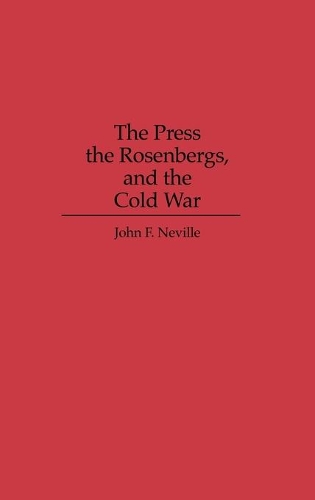
The Press, the Rosenbergs, and the Cold War
(Hardback)
Publishing Details
The Press, the Rosenbergs, and the Cold War
By (Author) John Neville
Bloomsbury Publishing PLC
Praeger Publishers Inc
26th September 1995
United States
Classifications
Tertiary Education
Non Fiction
Crime and criminology
Media studies
364.1310922
Physical Properties
Hardback
224
Width 156mm, Height 235mm
454g
Description
This book is a study of cold war agenda setting in relation to the Julius and Ethel Rosenberg spy case. Its primary interest is with press coverage of the case from 1950 to 1953, although the historical focus of the case extends before and beyond those years. The purpose of the book is not to debate the Rosenbergs' guilt or innocence, but rather to provide a fresh view of the case in its most political terms: news coverage filtered through the dynamics of cold war patriotism. A large sample of U.S. and foreign newspapers and magazines was monitored to determine if the Rosenbergs were victims of sensational pretrial and during-trial newspaper publicity. Neville also determines if the press reported on the claims of a U.S. left-wing newspaper, the National Guardian, that the Rosenbergs were framed by the U.S. government with the complicity of the news media. His conclusions question whether the mainstream press and news media ignore issues of justice for radicals in time of war and political crisis.
Reviews
Neville has added to knowledge of the Rosenberg case by focusing on the role of the mainstream press in its coverage of both their trial and their appeal for a stay of execution. He argues that news coverage of this major espionage trial was filtered through information provided by the government. Upper-division undergraduates and above.-Choice
The book escapsulates the myriad details of the complex case withput losing its focus...This is a solid addition to the literature and deserves a wide readership.-Journalism History
"The book escapsulates the myriad details of the complex case withput losing its focus...This is a solid addition to the literature and deserves a wide readership."-Journalism History
"Neville has added to knowledge of the Rosenberg case by focusing on the role of the mainstream press in its coverage of both their trial and their appeal for a stay of execution. He argues that news coverage of this major espionage trial was filtered through information provided by the government. Upper-division undergraduates and above."-Choice
Author Bio
JOHN F. NEVILLE holds a Ph.D. from the University of Minnesota. He has also worked as a regional freelance newspaper and magazine reporter and as a public relations writer.
